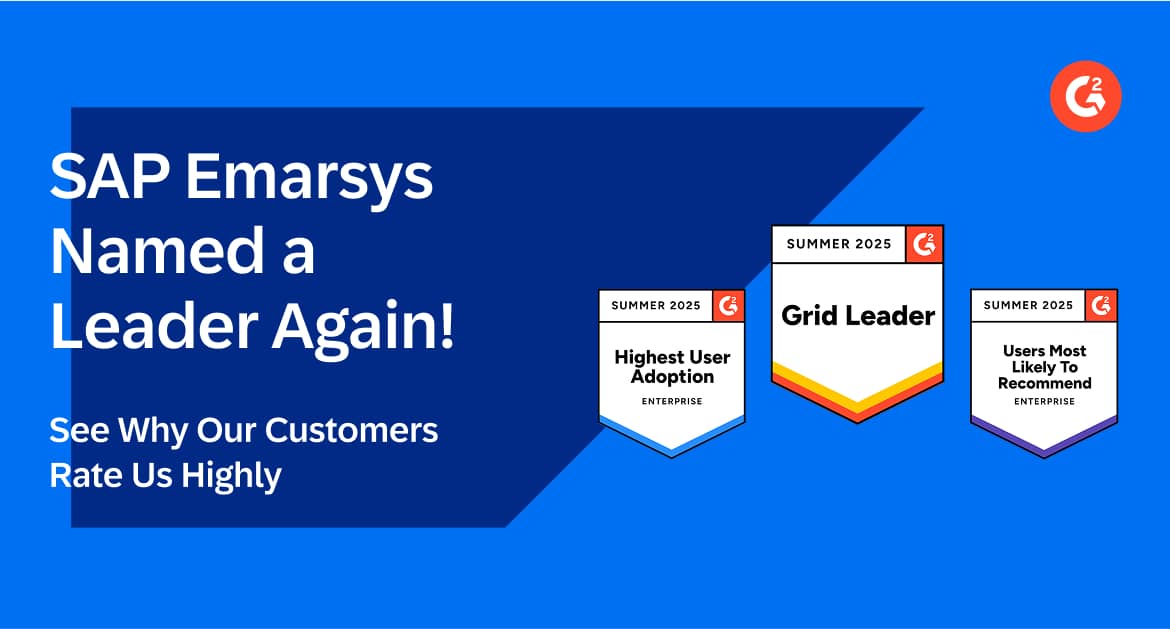Not that long ago, artificial intelligence (AI) was viewed as promising technology but a solution that only tech companies could invest in and benefit from.
Yet, today, we are quickly arriving at a major tipping point where companies who have been slow to explore AI will find it harder and harder to catch up to those who have already adopted and implemented AI tech in their marketing plans. The results are myriad, further convincing the hesitant and technophobic that AI’s here to stay and increasingly essential in any modern marketing environment.
Business decision makers already see AI as a revolution engine, finally addressing something humans can’t do: make sense of billions of pieces of data in the moment.
However, in the world of real-time B2C marketing campaign execution, there is a gap to mind, a disruptive chasm between the AI marketing solutions that are available and how ready marketers and business leadership teams are to adopt AI.
Recently, Emarsys commissioned Forrester Consulting to conduct a survey of 717 business leaders and decision makers on how ready they are to take on AI. Here are the most important takeaways:
1) Artificial Intelligence Marketing Drives Revenue Growth
In the Forrester study, the #1 objective that surveyed businesses want to achieve with AI is to drive revenue growth, and AI marketing provides different ways to do this.
For example, customer retention plays a large role in increasing revenue growth, and AI makes it possible to engage existing customers in more meaningful ways than ever before. If a company can increase its retention rate by as little as 5%, profits can go up to anywhere between 25% and 95%.1 While the greatest amount of revenue comes from engaging your present customers, AI also allows marketers to more accurately target prospects and bring in new business.
The revenue-driving power of AI has not gone unnoticed. With over three quarters of the organizations polled stating that they plan to bulk up their budgets for AI technologies by 5% or more in the next year, the industry is moving beyond buzzwords and hype to a tangible AI solution.
2) AI as an Engaging Customer Retention Engine
The #2 objective that the surveyed businesses want to achieve with AI is to better serve existing customers, which is wise. Customer acquisition costs five times more than retaining existing customers, and the probability of selling to an existing customer is 60%-70% while selling to a new customer is only 5%-20%.
The Forrester study illustrates the benefits of AI implementation with 96% of the experts (those who are furthest along in their AI implementation) and 86% of the opportunists (the next category in AI development) stating they are strong to exceptional in engaging and retaining customers employing the most effective tactics, such as email and social media to provide valuable, educational content or special offers.
Another intriguing fact shown in the study is that 49% of experts and 33% of opportunists consider themselves the fastest-growing organizations in their industry, compared to just 13% of novices and 8% of laggards. We think this supports the idea that companies that mature and follow through on their AI marketing strategy are better able to leverage the latest technologies to gain performance boosts and establish a competitive advantage. In an already competitive retail landscape, companies that can build unique selling propositions with significant differentiation through customer engagement are better positioned to keep their customers coming back.
3) AI Targets Segments More Accurately
Targeting the right audience is an elemental foundation of marketing, but as the data mountain has gotten larger and more ominous, accurate segmentation has become increasingly more challenging, because everything is changing all the time. If you don’t have a way to update your customer data as that new info is coming in, you’ll always be a little off in your targeting.
With an AI-powered segmentation engine, marketers can go beyond collecting data, better understand each buyer’s purchasing behavior, automate segmentation and communication, and create more effective, highly personalized interactions. This, in turn, improves response rates, reduces costs, and generates higher marketing ROI.
One particular area where AI targeting is especially beneficial is in the search for new prospects. The Forrester study found that one of the top five ways that companies want to use AI is for targeting appropriate prospect audiences, and the online channels used by most marketers for acquisition are paid search (86%), online display advertising (85%), SEO (66%) and web retargeting (61%).2
4) Marketers Can Take Real-Time Action on AI-Derived Insights
The study confirms that companies have been struggling to understand the customer data they collect, and that only by using AI can they derive insights from that data in real time and then through automation and event triggers, take the appropriate action to engage with the customer.
Because making sense out of mountains of data exceeds our cognitive capacity, marketers are at a significant crossroads, creating an ideal scenario for implementing AI technologies that will allow marketing staff to focus on value-generating tasks.
It’s interesting that while 76% of companies prioritize Customer Lifetime Value (CLV) as a significant concept, only 42% are able to actually measure CLVs with any accuracy.3 If you don’t know what your data is saying, tracking CLV is impossible. Traditionally, generating insights and taking the right marketing action existed separately from one another, and since the process of mining the data and applying actionable insights has mostly been a manual one, it has simply taken too long for many companies to take action on their data analysis.
However, the study shows that 52% of firms say that they’re able to manage real-time customer interactions with the brand, and they’re doing it with AI and its built-in ability to consume real-time data at scale from a broad range of sources.
5) AI Helps Build Omnichannel
The #3 objective that surveyed businesses want to use AI to achieve is to meet rising customer expectations. Averaging 4.5 connected devices when interacting with a brand4, customers now expect an omnichannel experience where they might start their buying journey on a website, switch to a mobile app, and finish by purchasing in-store. By leveraging AI technology, companies can meet this demand and create efficient and consistent experiences while also automating time-consuming tasks that take marketers away from creative and strategy.
The Forrester study shows that respondents agreed that a company-wide CX strategy is paramount for them to be successful, and to improve the CX, the entire organization must be unanimously committed to the idea that CX improvement is critical for their AI marketing initiatives to succeed.
6) AI Tools Companies Crave Most
While neural networks and other complex forms of artificial intelligence are not the first things that come to most leaders’ minds when evaluating technology, there are some proven must-haves identified by companies who have already implemented AI. Also critical here is that no single AI tool or point solution will help organizations reach their goals; a collection of tools is required, prioritized by respondents as follows:
- 43% plan to unleash AI-enhanced advanced analytics.
- 40% are drawn to AI-driven recommendation engines.
- 37% are interested in machine learning and how it supports automation primarily through pattern recognition.
- 35% value AI’s powerful customer analytics.
- 30% want to employ AI’s send time optimization capabilities, which determine the best times for sending email based on customer data.
Together, these AI marketing tools allow marketers to fully leverage the data they collect and connect insights to execution – drastically cutting the insight-to-action gap and addressing real-time customer needs.
7) Building Brand Loyalty Through AI-Driven CX
It should be no surprise that 73% of consumers prefer buying from brands that personalize the shopping experience. This instills faith in and loyalty to the brand. As the Forrester study points out, retail and e-commerce decision makers see AI as a method for improving and strengthening their brands – the #5 objective that surveyed decision makers want AI to accomplish – and intend to apply AI to improve/strengthen their brand.
Personalization is one of AI’s most attractive features, but retailers admit they can’t predict what features users will value most, which is why 84% of the surveyed decision makers plan to include customer feedback as a key component to improving CX. The good news is that 81% of those surveyed believe their entire organization is unified around and committed to enhancing the shopping experience and uplifting brand loyalty.
8) AI Reinforces Competitive Advantage
Remaining competitive is the #4 objective companies want to achieve with AI, and the technology certainly gives marketers an advantage over those who are slow to invest and implement.
Out of the 717 retail and e-commerce decision makers surveyed in the Forrester study, 42% of them are presently piloting, implementing or expanding their AI programs. That’s just under half who have recognized AI’s potential early on and are in the middle of integrating the tech and expanding into all channels. The study also identifies that 62% of these leading organizations see their AI marketing initiatives as part of a broader business transformation initiative.
With 21% in the early stages of evaluating AI, the remaining 37% of those surveyed are perhaps interested but have yet to do anything. That number will decrease as companies either invest in AI to remain competitive or forever fall behind in the marketplace. With 78% of the polled organizations projecting that spend on AI marketing technologies will increase over the next 12 months by 5% or more and the majority of surveyed companies planning to implement AI over the next 6 to 12 months, the picture has now come into focus: AI has arrived and will be central to retail and e-commerce core initiatives.
9) Perceived Skill Set Deficit as a Barrier to AI Adoption
One of the more interesting insights that the Forrester study reveals is that many decision makers believe, whether there is hard evidence or not, that either their internal processes can’t be adapted to handle AI or that the present staff lacks the technological skill set to adapt.
Switching over to an AI strategy is a big – and necessary – decision, and any time a company implements and integrate new software is a challenging time. Retailers are already having trouble keeping up with today’s fast-moving customers and complex omnichannel customer relationships. These challenges are compounded by how leaders perceive the adoption of AI, specifically breaking down like this:
- #5 fear: 63% of surveyed companies don’t think they can find a compatible technology and service provider to support an AI marketing strategy.
- #4 fear: 64% firmly believe that AI technologies are designed for data scientists and do not offer marketer-friendly capabilities.
- #3 fear: 65% said they do not have the product management skills required for managing the ongoing and incremental innovation of AI marketing.
- #2 fear: 65% see AI as an overly complex proposal that may not merge well with inflexible business processes.
- #1 fear: 66% see a lack of technical skills among internal staff as the biggest barrier to AI adoption.
While it’s true that not all firms will have every single skill required and that, given the talent shortage, it will be difficult to rely on external recruitment to fill the gaps, there is another profound gap between what decision makers believe and what the internal staff thinks to be true. Forrester found that users demonstrated a better understanding than the leaders of what AI can do, namely, enable and optimize. In fact, only 29% of users feel they lack the skills to implement the tech.
Since AI marketing embeds complex analytics in user-friendly tools that automatically discover trends in customer behavior, AI will actually remove many of the entry barriers for businesses that previously resisted next-generation tools. The big takeaway here is that decision makers must educate themselves in all things AI before making an adoption decision.
10) AI Will Revolutionize Marketing
We are at a tipping point where most, if not all, e-commerce and retailers are aware of AI’s potential to improve so many areas, and looking forward, the Forrester study shows that 3 out of 5 (60%) retail and e-commerce firms expect to implement AI marketing technologies within the next 12 months. For those companies who are already on the AI path, the report shows some promising projections.
The study breaks respondents down into four groups by how far along each company is in adopting AI. One of the more noticeable takeaways here is that experts (those farthest along on the AI path) responded far more emphatically than the other three groups in terms of how they see AI transforming marketing – from 10% to as much as 27% higher than the next closest category.
Overall, 79% of all companies surveyed believe AI technology will shift the role of marketing toward more strategic work, such as audience segmentation, product innovation, and incentives. They also believe that AI will make marketing teams more efficient (86%) and more effective (86%) in their customer interactions, specifically enabling marketers to focus on value-generating strategy as AI automates the time-costly tasks (82%).
We think perhaps the most stunning finding that the survey shows is that most marketing firms agree or strongly agree that AI will reinvent the retail industry (88%) and dramatically change what their companies do (81%).
Conclusion
To be successful today and well into the future, marketers must leverage their greatest asset: data. However, analyzing that data and reacting to it in real time doesn’t scale.
Artificial intelligence marketing is the solution, and from the gains the early adopters are achieving, the message is obvious: It no longer matters if you believe in AI. The gauntlet now is about the speed at which companies who have lagged in their acceptance of AI are able to catch up with those already in the process of implementing AI into their marketing strategies.
Are you #Ready4AI?
For more, download the full Forrester AI Readiness Study for free:
¹ “Customer Acquisition vs. Retention” infographic, Sailthru, Inc., March 10, 2016
2Ibid.
3Ibid.
4“The Top Emerging Technologies For B2C Marketers”, Forrester Research, Inc., April 6, 2017













